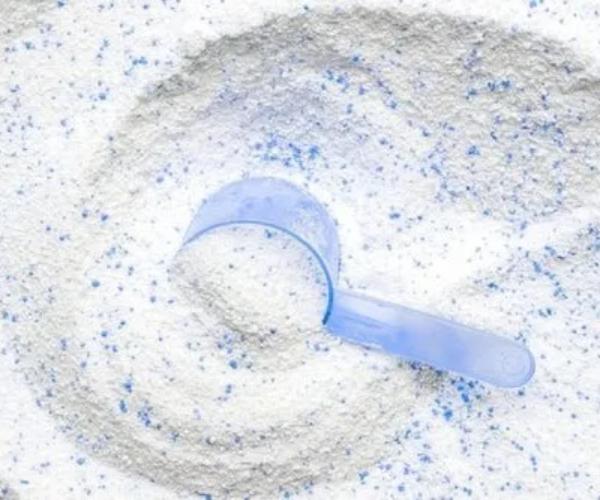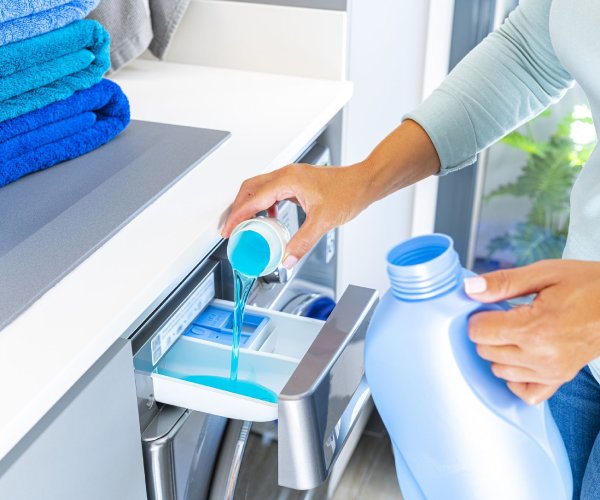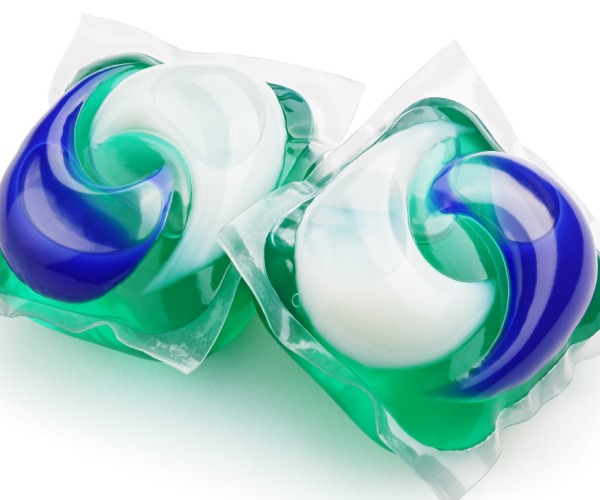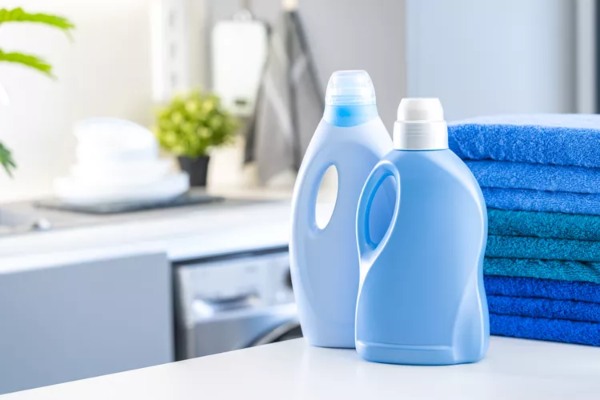Laundry detergent is a type of cleaning agent that is primarily used to clean dirty clothes. It is formulated with enzymes and surfactants, which are also very useful for other chores, including washing the dishes and dissolving clogs.
You might be shocked to see the multiple uses of laundry detergents besides just washing clothes. Before starting our lesson, you must remember one thing about these tips. These detergents are best known as in-a-pinch solutions.
They are always not the best option for cleaning jobs because it is formulated specifically for clothing and other textiles. It is intended to be used in a washing machine or hand-laundering setting. Luckily, it can come in handy at times in the laundry room.
Some Things to Clean Using Laundry Detergent
1. Carpet and upholstery
If your little one has spilled their favorite drink all over your couch or carpet? You need not worry as liquid laundry detergent is your savior. All you gotta do is dilute 1 tsp. liquid laundry detergent in a small bowl of water, dip a light-colored cloth in the solution and scrub out the stains. After that, rinse the rag and then make sure to go over the area properly to remove the detergent residue so it doesn’t oxidize and darken over time. This method works equally well on common stains, from food and drink spills to crayons and pet messes.
2. Outdoor furniture
Diluted laundry detergent can clean all types of outdoor furniture from plastic to wood to fabric. Dip a bristled brush or rag in a detergent solution and use it to lift grime, pollen, mold, dirt, mold, and mildew from outdoor chairs tables, and umbrellas. Rinse the furniture well after cleaning it and let it dry properly in the sun.
3. Concrete and Other Outdoor surfaces
Concentrated liquid laundry detergent is used to remove oil and stains from the driveway, garage, or other outdoor surfaces. Pour a small amount of liquid laundry detergent directly onto the stain and scrub the area properly with a stiff bristle brush until it vanishes. Allow the detergent to sit for 15 to 20 minutes, then rinse the area with a hose or power washer. Diluted liquid laundry detergent can also be used to give outdoor surfaces an all-over cleaning.
4. Kids’ Toys
This one’s for parents with kids who are tired of their little ones getting their toys dirty. Soak hard plastic toys in a solution of laundry detergent that you have to dilute in warm water to remove buildup, dirt, bacteria, and germs. Not just the plastic toys but also dolls or stuffed animals can also be cleaned using the same solution. Instead of soaking them, all you gotta do is dip a soft cloth in the diluted detergent and gently scrub the toys clean.
5. Bathtubs
Laundry detergents are formulated with ingredients that are formulated to remove bio-based soils like sweat or dead skin making it an effective bathroom cleaner. To clean, dilute laundry detergent in water to make a tub-cleaning agent that will break down soap scum, which is a mix of soap and bio-based elements like sebum and dead skin, quickly and easily.
6. Clogs and Drains
Thanks to laundry detergent and very hot water which can also loosen clogs and slow-moving drains. If you have a slow-moving drain, cure it by pouring ¼ cup liquid laundry detergent down the drain. Wait 15 to 20 minutes, and then carefully pour boiling water down the drain to remove buildup and blockages.
7. Dishes
If you ever run out of dish soap with a sink full of pots and pans and plates you can use laundry detergent as a substitute for dish soap. Liquid laundry detergent is the best solution for this. Remember that most liquid laundry detergents are more highly concentrated than dish soaps and use a sparing amount to avoid the need for excessive rinsing.
8. Hands
If your hand soap is finished, laundry detergent, especially liquid laundry detergent can be the best substitute. It can remove stains from hands, like motor oil or paint.
However, you need to moisturize your hands well after washing your hands with laundry detergent. This is because the highly concentrated formula can be harsher on delicate skin than soaps formulated specifically for hand-washing.
9. Stains
This one is a use for laundry detergent that involves clothes but there’s a handy tip that you should keep in mind. Liquid detergents are an excellent stand-in for stain pretreatment products. To use pretreat stains using laundry detergents, dab a small amount directly onto the stain before laundering. Allow 10 to 15 minutes for the detergent to penetrate the stain, and then wash the item as usual.
Also, Read Top 10 Best Microgreens to Grow at Home!
Conventional Types of Laundry Detergents
1. Powder Detergents
Powder Detergents are simply the most affordable detergent. They are also more environmentally friendly than their liquid or gel counterparts, as they are often made from biodegradable materials. However, they can also be messy to use and may leave white residue on clothes if not washed properly.

2. Liquid Detergents
Liquid detergents are the easiest and most effective to use and generally produce less residue than powder detergents. However, they are more expensive than other types of detergent, and some people find them difficult to rinse out of clothes.

3. Detergent Pods
Detergent Pods are the latest type of laundry detergent that is growing popular. Since they are easy to use and leave less residue than both powder and liquid detergents. However, they are more expensive than other types of detergents and are harder to control.

FAQs
1. What are the factors to consider while choosing a laundry detergent?
Keep these things in mind while choosing a laundry detergent:
- The type of fabric of your clothes
- The amount of dirt or stains on your clothes
- Your budget and value of the product per load
- Do you have sensitive skin or any specific issue that needs attention?
- Do you need a detergent specifically designed for high-efficiency machines?
- Do you want an environmentally friendly product?
2. Is there a good substitute for laundry detergent?
Vinegar is a great detergent-free alternative to laundry detergents. It is a natural disinfectant and can easily remove stains and odors from clothes. Add a cup of vinegar to the rinse cycle of your washing machine to get rid of the dirt. It acts as a handy first-aid in certain situations. However, don’t expect magical results or perfect cleanliness.
3. How long can a liquid laundry detergent last?
Liquid detergent can normally last for up to two years after the expiration date if it’s stored in a cool, dry place. If you sense your liquid detergent has started giving a strange smell or isn’t working properly, then it’s time to throw it away and get a new one. It’s best to keep the detergents in their original package, tightly closed.
4. Is detergent pods helpful?
Laundry detergent pods are convenient because you don’t have to measure out the detergent before adding it to the washer. However, if you decide to use this, make sure to keep them out of reach of kids and pets because they contain high levels of chemicals and surfactants which might cause vomiting, nausea, and even death if ingested.
Also, Read Surprising Facts About Baby Shampoos That You Probably Didn’t Know!
